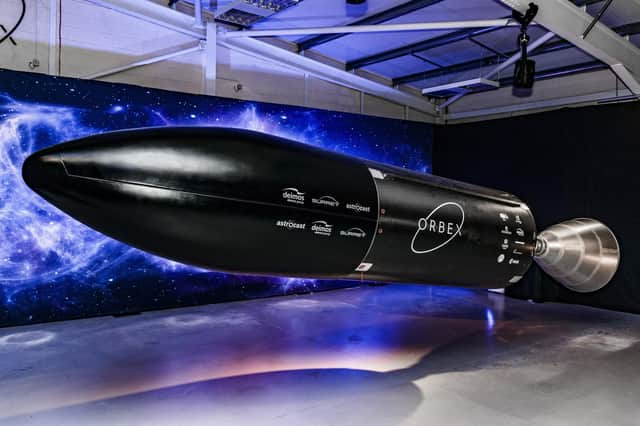Countdown continues to Sutherland spaceport after order placed for largest industrial 3D printer in Europe


Orbex will use the giant machine to rapidly print complex rocket engines in-house. It has signed a multi-million pound deal with AMCM, following a series of successful trials printing various large-scale rocket components.
The custom-made 3D printer will allow the Forres firm to print some 35 large-scale rocket engine and main stage turbo-pump systems annually as it scales up its production capabilities for launches.
Advertisement
Hide AdAdvertisement
Hide AdTo accommodate the new machinery, Orbex is expanding its factory floor space by an additional 1,000 square metres.
Chief executive Chris Larmour said: “Although our rocket engines and other critical systems are already quite mature after years of testing, a large-scale in-house 3D printing system like this gives us far greater speed and agility as we ramp up production.
“It means we can continue to iterate and drive up performance even further. Longer term, as we get ready for multiple launches per year, it will give us greater control over our costs and supply chain.
“After exhaustive trials, the results we’ve seen from AMCM were very successful and we’re confident that we’ve made the right choice of partner.”
The 3D printing system will generate rocket parts using a custom blend of metals including titanium and aluminium to create a lightweight system designed to withstand the temperature and pressure extremes of spaceflight.
The company plans to print components such as rocket engines as a single piece, eliminating the weaknesses which can arise from conventional joining and welding techniques.
The 3D printed rocket components will be critical parts of Orbex’s launch vehicle – a 19-metre long rocket, designed to deliver small satellites into polar orbits around the Earth.
Planning permission was granted for the firm’s home spaceport, Space Hub Sutherland, in August. The site is currently the only UK spaceport to receive planning permission, with construction expected to begin later this year and the first orbital launch pencilled in for 2022.
Advertisement
Hide AdAdvertisement
Hide AdMartin Bullemer, managing director of AMCM, said: “Investing in a large-scale 3D printing system like this says a lot about Orbex’s ambition in the European spaceflight sector.
“If they are to lead the European market, they need the production reliability and speed that a large-scale 3D printing system like this will give them. And although this is a major purchase, it will allow for significant cost control for Orbex in the years to come.”
In December, Orbex said it had secured $24 million (£18m) in a funding round led by BGF – formerly the Business Growth Fund – and venture capital outfit Octopus Ventures.
They have joined existing investors High-Tech Grunderfonds, Heartcore Capital and Elecnor SA – parent company of the multi-national space firm Deimos Space. The new investments secure the roadmap to the first launch from the Sutherland spaceport.
Conceived as an environmentally sustainable launch system, the Orbex rocket uses bio-propane, a renewable biofuel that cuts CO2 emissions by 90 per cent compared to traditional kerosene-based rocket fuels.
A message from the Editor:
Thank you for reading this article. We’re more reliant on your support than ever as the shift in consumer habits brought about by coronavirus impacts our advertisers. If you haven’t already, please consider supporting our trusted, fact-checked journalism by taking out a digital subscription: www.scotsman.com/subscriptions
Comments
Want to join the conversation? Please or to comment on this article.